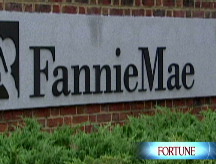Freddie: $25B loss, taps tax dollars
Mortgage finance firm reports huge quarterly loss - Treasury pumps in $14 billion backstop.
NEW YORK (CNNMoney.com) -- Freddie Mac reported a $25 billion quarterly loss Friday that forced the mortgage finance giant to tap $100 billion in bailout money set aside by the government.
The loss triggered a $13.8 billion Treasury Department investment in Freddie (FRE, Fortune 500). The firm is likely to get the money by the end of the month; Treasury will receive preferred shares in return. A Treasury spokeswoman did not have any immediate comment.
Treasury and regulator Federal Home Finance Authority announced on Sept. 7 that they had taken control of Freddie and Fannie Mae, the other giant mortgage finance company, when it became clear that mounting losses on bad mortgages would cause them to run out money.
At the time, the Treasury committed $100 billion apiece to back up the two firms. Friday's announcement is the first major investment of taxpayer cash into the firms during the current crisis.
Freddie's third-quarter loss came to $19.44 a share, far larger than the $1.2 billion, or $2.07 a share it lost in the year-earlier period. Much of that loss came from a $14 billion non-cash charge to write down the value of tax credits it had built up. Doubts about the ability of the company to make money in the future and utilize those tax credits caused that charge.
It also took a $9 billion charge to write down the value of securities it held on its books.
But even without those charges, the company's performance was significantly worse than in previous quarters. Freddie's losses from credit-related expenses, essentially those on the loans that it backs or owns, soared to $6 billion, compared to $2.8 billion in the second quarter and $1.4 billion in the year-earlier period. Losses from non-interest expense also soared to $1.4 billion.
The total number of loans that are either 90 days or more past due or in foreclosure soared to 167,807 as of Sept. 30, up 46% from three months earlier. It set aside an additional $5.7 billion during the quarter to deal with the rising loan losses.
The stunning hit to Freddie Mac comes four days after the much larger Fannie Mae reported a $29 billion loss. Fannie has yet to start drawing on its $100 billion Treasury backstop, although it said it may have to tap into the money soon if losses continue at the current pace in the fourth quarter.
Freddie and Fannie Mae (FNM, Fortune 500) were set up by Congress to help spur mortgage lending. While they operated under government charter, they were owned by taxpayers and paid their profits to investors.
The assumption that the federal government would stand behind their debt allowed them to borrow money cheaply. They used that money to buy huge blocks of private mortgages, which were packaged into securities and held by the firms or sold to other investors with guarantees that the mortgage loans would be paid by home owners.
Together the two firms own or back about $5 trillion in home loans, about half of all loans outstanding. But as house prices started to fall, the rates of defaults started to soar. The two firms lost a combined $12 billion in the four quarters leading up to the most recent quarter.
Jaret Seiberg, a financial services analyst at the Stanford Group, said the losses for Fannie and Freddie weren't really much of a surprise, given that the federal government has continued to depend on the firms to keep money flowing to the battered home loan market.
"Fannie and Freddie have become creatures of the federal government, and they're being used to achieve policy aims, not profit aims," said Seiberg. "You could have run them much more conservatively, put them in run-off mode. You could have allowed them to conserve capital rather than put it to work. But that would have been far worse for the economy."
On Tuesday, Treasury and the FHFA announced a new loan modification program aimed at home owners behind in their mortgage payments by three months or more whose home loans are either owned or guaranteed by Fannie or Freddie. Under the program, interest rates on the loans could be reduced or payment schedules stretched out so that homeowners could better afford their loans. ![]()


